As part of the EUCE/ESC's Irish Studies Week, Profesors Sabina Deitrick (Associate Professor in GSPIA and Co-Director of UCSUR's Urban and Regional Planning Program) and Tracy Soska (Professor in the School of Social Work, COSA Chair, and Director of Continuing Education) will share their experiences visiting Ireland and Northern Ireland as co-Directors of Pitt's Community Outreach Partnership Center. They went to the island to meet, present to, consult with, and learn from university and community colleagues. During this session, they will share lessons learned and progress made in such sites as Dublin, Limerick, Cork, Derry and Belfast. Lunch will be provided.
Monday, September 10th, 2012
Monday, September 10th, 2012 to Friday, September 14th, 2012
From September 10-14, 2012 the EUCE/ESC will host Irish Studies Week. The activities will include a video conference, center lectures on Gaelic Revivals, The Irish in Pittsburgh, the Idea of Poverty in Ireland, and Irish Culture. Please check back for a full list of programs.
Wednesday, September 5th, 2012
The European Union Center of Excellence and European Studies Center welcome back students and faculty and usher in the new academic year with refreshments and conversation. Wilkommen, bienvenue, welcome - we hope to see you there.
Author of the first Pittsburgh Papers publication will give a lecture based on her research on the role of private companies in spreading EU based environmental norms.
Thursday, May 10th, 2012 to Saturday, May 12th, 2012
This three-day symposium "Crossing Borders: Ways of Constructing Identities" will take place at the University of Augsburg as a joint graduate student conference between the University of Augsburg and the University of Pittsburgh. Fifteen total graduate students will present: five graduate students from the University of Pittsburgh and ten from the University of Augsburg will be giving individual presentations on topics related to their dissertation research. The Faculty of Philology and History at the University of Augsburg will provide conference rooms.
Wednesday, May 9th, 2012
On Monday, François Hollande became the first French Socialist candidate elected president since 1981. He campaigned for higher government spending and taxation. Does this signal a new economic approach to Europe’s financial problems? What might happen to austerity? And what is the Socialist economic approach? Dr. Alberta Sbragia, University of Pittsburgh Vice Provost and former Director of the European Studies Center and the European Union Center of Excellence addresses these questions, and talks about the future of the EU.
Friday, May 4th, 2012 to Saturday, May 5th, 2012
Regulating Unregulated Migration:
European and U.S. Reactions to Immigration
Friday, May 4th
9:00-9:30 Continental Breakfast
9:30-10:00 Welcome and Introductions
Suzanna Crage, Department of Sociology, University of Pittsburgh
Ronald Linden, Director, European Union Center of Excellence/European Studies Center
10-11:30 The EU & U.S.: Demographic trends
Martin Schain, Department of Politics, New York University
11:30-1:30 Lunch (for registered participants)
Presentation: Public opinion about migration in the US and selected European countries
Hamutal Bernstein, German Marshall Fund
1:45-3:15 US migration politics, Arizona immigration laws, US Courts
Marc Rosenblum, Congressional Research Service, U.S. Library of Congress
Luis F.B. Plascencia, Dept. of Social and Behavioral Sciences, Arizona State University
3:30-5:00 Approaches to controlling migration in Pennsylvania, Alabama, and Texas
Jan Ting, Beasley School of Law, Temple University
Shay Farlay, Alabama Appleseed Center for Law & Justice Inc., Montgomery, AL
Faye Kolly, De Mott, McChesney, Curtright & Armendáriz, LLP, Immigration and Criminal Defense Attorneys, Austin, Texas
Saturday, May 5th
8:30-9:00 Continental breakfast
9:00-10:30 EU politics, policies, and practices
Kris Pollet, European Council on Refugees and Exiles, Brussels, Belgium
Adam Luedtke, Political Science Dept., Stockton College
10:45-12:15 Migration control in the Mediterranean
Nick Vaughan-Williams, Dept. of Politics and International Studies, University of Warwick
Cetta Mainwaring, International Relations, Wadham College, Oxford University
All panels are free and open to the public.
Organized by Suzanna Crage, Dept of Sociology
Sunday, April 22nd, 2012
From medieval pogroms to modern racial science, Jewish history in Europe has come to stand as a test case for thinking about problems of historical continuity and change, embodied most clearly in the tension between narratives emphasizing a timeless antisemitism and arguments for the distinctive mentalities associated with discrete historical periods. Our colloquium, “The Holocaust and the Middle Ages,” seeks to reexamine Jewish history as a multi-layered problem of narrative and conceptualization, in which deeply interested anti-Jewish narratives from the premodern world form points of explosive contact with modern literary and historical modes of analysis. Part of our work is to examine how later historical lenses, such as the interests of post-Reformation history and the consuming project of Holocaust history, have substantially dictated the terms of modern understanding of Jewish-Christian relations, often with distorting effects. At the same time, medieval paradigms of religious conflict continue to operate as the unacknowledged foundations for contemporary efforts to think about problems of political conflict rooted in religious difference.
Our objective is to bring together a small group of scholars and encourage significant interdisciplinary dialogue between medievalists and specialists in later fields, including particularly Reformation history and Holocaust studies. In doing so, we hope to move beyond generalities about the evolution of Western patterns of religious conflict to gain critical purchase on the ways in which our narratives for thinking about these problems are deeply imbricated in the assumptions, needs, and theories at work within discrete moments of historical thought.
For more information, please visit our website (www.medren.pitt.edu) or contact the Director, Professor Jennifer Waldron (jwaldron@pitt.edu).
Friday, April 20th, 2012
The events collectively described as the “Arab Spring” are marked, at the local level, by the invention of novel modes of social and political action. On a transnational scale, these events are reshaping global alliances and raising pressing questions about the relationships between international political institutions and social movements driving change in North Africa and the Middle East. In the context of this rapidly evolving political landscape, this conference considers the implications of the Arab Spring for European politics and cultures. As a way of promoting a broad and interdisciplinary dialogue, the conference sets the Mediterranean, conceived of as an “in-between” space of multiple cultural flows, as its conceptual center.
Wednesday, April 18th, 2012
Tuesday, April 17th, 2012
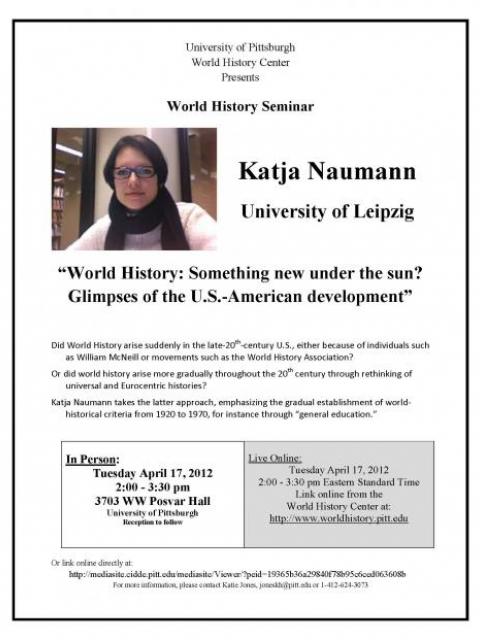
Did World History arise suddenly in the late-20th-century U.S., either because of individuals such as William McNeill or movements such as the World History Association? Or did world history arise more gradually throughout the 20th century through rethinking of universal and Eurocentric histories?
Katja Naumann takes the latter approach, emphasizing the gradual establishment of world-historical criteria from 1920 to 1970, for instance through “general education.”
In Person:
3703 WW Posvar Hall
Reception to follow
Live Online:
Link from the
World History Center at:
http://www.worldhistory.pitt.edu
Various speakers from the UK and Argentina meet through teleconference to talk about the Falkland/Malvinas conflict, then and now.
Saturday, April 14th, 2012
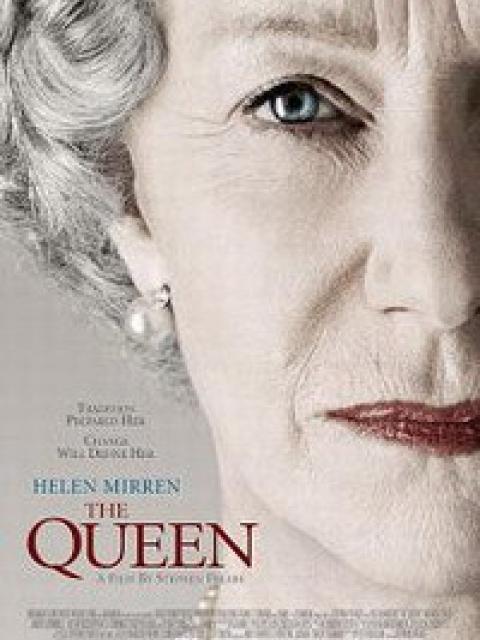
Screening of THE QUEEN will be introduced by Director, Stephen Frears. Q&A session with Colin MacCabe.
Known for making provocative, stylized, and tightly budgeted films about people living on society's social and/or sexual fringes,
British director Stephen Frears is renowned as one of his country's most vibrant and recognizable filmmakers. Regarding his
tendency to make films that branch into unfamiliar territory, Frears has said that he likes "making films about different cultures...I'm interested in things that I've never encountered before. I try to put myself in the audience's position." Born in Leicester, Frears studied law at Cambridge University before turning to the arts. He became involved with London's Royal Court Theatre, where he served as an assistant to director Lindsay Anderson and to actor Albert Finney. He started his career in the film industry as an assistant director to Karel Reisz, with whom he worked from 1966 until 1972.
Scripted by Peter Morgan, 2006's THE QUEEN took a comic-yet-sympathetic look at the P.R. nightmare that
ensued after Princess Diana's death in 1997. Bolstered by Helen Mirren's universally acclaimed work as Queen
Elizabeth II, the film enjoyed a healthy arthouse run through awards season, when Frears found himself the recipient
of countless Best Director nominations from critics' organizations, as well as the Golden Globe Awards.
Friday, April 13th, 2012
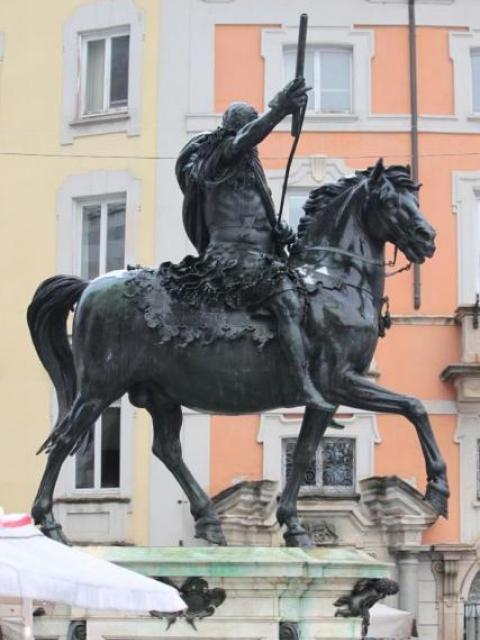
Prevailing accounts of the development of baroque sculpture take for granted the centrality of Gianlorenzo Bernini without probing the historical processes that led to the dominance of his art. The book Dr. Estelle Lingo is preparing takes the self-consciously ambitious sculptures of Bernini’s older contemporary, the Tuscan Francesco Mochi (1580-1654), as the entry point for an inquiry into the historical and cultural forces driving the transformation of sculpture in the first half of the seventeenth century. Mochi’s early biographer Giovanni Battista Passeri reported that the sculptor “always wanted to show himself a rigorous imitator of the Florentine manner.” Mochi’s determination to carry forward a Florentine and Michelangelesque tradition, while reconciling it with post-Tridentine religious imperatives, produced an extreme tension in his art that resulted in some of the most breathtaking sculptures of the century—though ultimately fracturing his career. In this lecture Dr. Lingo will present new work on Mochi’s highly unusual bronze equestrian monuments to Ranuccio I and Alessandro Farnese in Piacenza. The sculptures’ distinctive features, Lingo will argue, point to Mochi’s reflection upon Piacenza’s political circumstances and reveal unexpected aspects of the sculptor’s commitment to the Florentine tradition in a post-Tridentine climate of reform and censure.
Estelle Lingo is Associate Professor of Art History at the University of Washington. She specializes in early modern European art, especially sculpture. Her first book, François Duquesnoy and the Greek Ideal (Yale, 2007), examined seventeenth-century Flemish sculptor François Duquesnoy and his pursuit in Rome of a modern artistic practice in "the Greek manner." The study reconstructs the understanding of Greek art from 1550 to 1650 and the contributions of Duquesnoy's circle to the coalescence of the Greek ideal within European culture. This seventeenth-century vision of Greek art is shown to have formed the basis of Johann Joachim Winckelmann's early understanding of the formal perfections of Greek sculpture, overturning the longstanding assumption that no meaningful distinction between ancient Greek and Roman art was made prior to Winckelmann's work. Her current book project focuses on the Tuscan sculptor Francesco Mochi (1580-1654); the study takes Mochi's sculptures as the entry point for an inquiry into the historical and cultural forces reshaping sculpture at the beginning of the seventeenth century. Other research interests include Caravaggio, Gian Paolo Panini's Gallery Views, and the Italian perspective on the Grand Tour.
This talk is sponsored by the Department of the History of Art and Architecture and co-sponsored by the Program in Medieval and Renaissance Studies.
Stephen Brockmann is president of the German Studies Association and Professor of German at Carnegie Mellon University. He is the author, most recently, of A Critical History of German Film (2010), as well as of Nuremberg: The Imaginary Capital (2006), German Literary Culture at the Zero Hour (2004), and Literature and German Reunification (1999). In 2007 he won the DAAD Prize for Distinguished Scholarship in German and European Studies/Humanities. From 2002-2007 he was the managing editor of the Brecht Yearbook.
In the event of an evacuation, the talk will move to WWPH, room 1700.
Thursday, April 12th, 2012
B. Burcak Basbug-Erkan is an assistant professor of Statistics at the Middle East Technical University (METU), Ankara. She acts as the director of the METU Disaster Management Research and Implementation Centre since 2008. She holds a B.Sc. in statistics, METU, a M.Sc. degree in statistics, University of Warwick, the UK and a Ph.D. in statistics at the London School of Economics and Political Science, the UK. Her main research interest is disaster risk management, extreme event modelling, insurance and actuarial analysis and financial risk management of disaster losses. She teaches disaster risk management, linear models, insurance and actuarial analysis, probability and stochastic processes.
Wednesday, April 11th, 2012
Next Wednesday (April 11), the Society and Honors College will proudly play host to a prominent intellectual historian of our generation: J.G.A. Pocock, author of Ancient Constitution and the Feudal Law, Machiavellian Moment, and a multi-volume work on Edward Gibbon. An emeritus professor at Johns Hopkins, Pocock is noted for developing a novel approach to the study of history often referred to as the Cambridge School of intellectual history. His work encompasses a broad range of intellectual endeavors, including not only history, but also political science, philosophy, and literature. Professor Pocock will lecture at 602 Cathedral of Learning at 4:00 PM, and we'd love for you to come along and help Pitt show its support for history as an intellectual exercise.
Tuesday, April 10th, 2012
Matt Zwick, a student at the Law School, and local attorney David Rosenberg will present a paper they co-authored, entitled "Legal Professional Privilege: Comparing Different Approaches Within the United States and the European Union."
Monday, April 9th, 2012
Dr. Talley’s talk is part of a book-length project on the evacuation and children’s literature that has won grants from the National Endowment for the Humanities, the Children’s Literature Association, and the ALAN Foundation.
Dr. Lee Talley is Associate Professor of English at Rowan University where she teaches Victorian and children’s literature. She edited the Broadview edition of Anne Brontë’s The Tenant of Wildfell Hall and has most recently published in Children’s Literature and Keywords for Children’s Literature (edited by Philip Nel and Lissa Paul).
From the earliest stages of language processing, people use prosodic information in word recognition and to predict and construct the syntactic structure of an utterance in their native language (L1) (e.g., Eckstein & Friederici, 2006; Friederich et al., 2004; Isel et al., 2005; Pauker et al., 2011; Steinhauer, 2003; see also Cutler et al., 1997; Wagner & Watson, 2010, for two reviews). Recently, researchers have begun to explore how prosodic and syntactic information interact in language processing among second language (L2) speakers (e.g., Dekydtspotter et al.,2008; Fernandez 2005, 2010; Fultz, 2007; Schmidt-Kassow et al., 2011). In this talk I will present findings from several recent studies in my lab that contribute to this line of research. In the first study we used a sentence-level gating task to demonstrate that English L2 learners of German recognize the importance of prosodic phrasing to predict sentence length in the L2, although their ability to do so is influenced by L2 proficiency and language environment (immersed vs. non-immersed context). In a second study we show that more proficient English L2 learners of German and German L2 learners of English use prosodic cues (pitch and duration) to disambiguate temporarily ambiguous sentences in an oral production task in both of their languages, but that neither group of L2 learners fully transfers these acoustic cues to disambiguation from their L1 to their L2. In a third study we investigate how cross-linguistic differences in lexical stress modulate cognate effects in L2 word naming among English L2 learners of German.
Friday, April 6th, 2012
The 2012 Jean Monnet Symposium hosted by the European Union Center of Excellence and European Studies Center at the University of Pittsburgh will bring together historians and political scientists to discuss empires old and new. Its goal is to advance the current discussion of how to define empire, look at how empires have defined themselves in the past, and build upon our understanding of historical empires to refine new categories of analysis applicable to the European Union of the present. Featured presenters include Patrick Manning and Daniel Bisbee, Martha Chaiklin, and Peter Karsten from the Department of History at the University of Pittsburgh; along with Magali Gravier (Copenhagen Business School), Josep Colomer (George Washington University), and Joshua W. Walker (German Marshall Fund).
Co-sponsor: World History Center
Thursday, April 5th, 2012
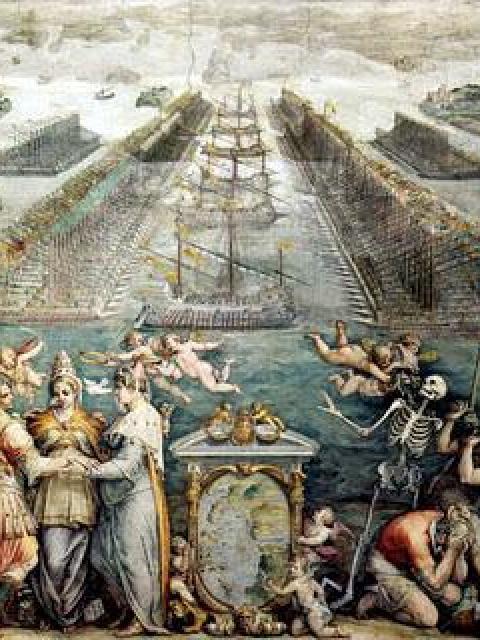
The great naval Battle of Lepanto of 1571 in which the Turkish armada was devastated by the combined fleet of the Papacy, Venice, and Spain was an event of enormous symbolic as well as military importance to the Catholic Church, because it briefly gained for the Christian Alliance control of most of the Mediterranean, temporarily eradicating the threat of the “infidel”. Several Italian and Spanish artists depicted the battle but none so splendidly as Giorgio Vasari (1511-1574) in the Sala Regia of the Vatican Palace. Despite its prominent location in the administrative heart of the papacy and the fame of Vasari, the literature on this huge fresco cycle was scant before Dr. Scorza published two recent articles. Dr. Scorza will explain this cycle with reference to the literary and visual sources available to Vasari when he painted it, ranging from prints, drawings of Venetian galleys which were smuggled to Rome, and above all the beautifully sculpted bronze medals commemorating the victory which were circulated by the Papal mint. The lecture will also discuss the plight of enslaved oarsmen, and how a former Christian galley slave in Muslim hands rose to become captain and ultimately Grand Admiral of the Turkish fleet, having totally outwitted his opposite number at Lepanto and returned triumphant to Istanbul with the battle standard of the Knights of Malta. Within three years Uluch Ali - a renegade Christian - regained Turkish dominance of the Mediterranean.
Dr. Scorza took his M Phil from the Warburg Institute in the Survival of the Classical Tradition and then completed a PhD in Art History at the Warburg. He has published significant articles on a variety of topics in The Burlington Magazine, the Journal of the Warburg and Courtauld Institutes, and elsewhere. He has also contributed to exhibition catalogues, most recently for the Giorgio Vasari exhibition in Arezzo celebrating the 500th anniversary of Vasari’s birth. He has given papers in several international conferences, including one titled “The Iconography of Slavery.”
This talk is sponsored by the Department of the History of Art and Architecture and co-sponsored by the Program in Medieval and Renaissance Studies, the Humanities Center, the History Department, and the Department of French and Italian.
Colloquium on Germany, Sabine Von Dirke (German), "White Collar Blues: Immaterial Labor and its Discontent,” with responses from Stephen Brockmann (Carnegie Mellon) and Lisa Brush (Sociology).
Wednesday, April 4th, 2012
INFORMATION SESSION: Career and Internship Opportunities with the U.S. Dept. of State
Tom Armbruster
Senior Foreign Service Officer
Diplomat in Residence
City College of New York
Date: April 4th, 2012
Time: 1:00
Place: 4130 Posvar Hall
Come see how you can contribute to and join Secretary Clinton’s foreign policy professionals who manage America’s relations with the world. The Foreign Service offers the opportunity for public service, challenge, lifelong learning, foreign language study, and the chance to live and work overseas. On Wednesday, April 4, Senior Foreign Service Officer Tom Armbruster, most recently U.S. Consul General in Vladivostok, Russia, will present a discussion on State Department internships, both in American embassies and consulates abroad, and at State Department headquarters in Washington. Mr. Armbruster will also describe the process for becoming a Foreign Service Officer and the 13 dimensions that successful candidates demonstrate. Foreign Service officers serve in these career tracks: Consular – touching the lives of others through American citizen service and visa adjudications; Management – making diplomacy work and keeping our Embassies and Consulates running; Economic – promoting economic partnerships, free markets and trade; Public Diplomacy – explaining American values and policies through speakers, exchanges, and cultural programming; Political - analyzing political events and advising Washington and the “country team” at the Embassy, headed by the Ambassador.
Tuesday, April 3rd, 2012
Join us on Tuesday, April 3rd as three alumni of the European Studies Center discuss how their interests in
Foreign language and international studies have shaped their postgraduate lives. Panelists include Christopher Burdick, Policy Advisor for the U.S. Treasury; Benjamin Keller – lawyer for DLA Piper in N.Y.C.; Carrie Weintraub, International Relations graduate from the London School of Economics. Some of the issues to be discussed include: pursuing graduate studies in Europe, preparing for law/graduate school, the importance of networking, what it’s like working for law firms and/or the government, and what tips and suggestions they would offer undergraduates in European or international studies programs now. International Studies and pre law counselors from the Career Center will also be available to answer questions and provide information about resources and planning strategies. If you have questions about this event, please contact Steve Lund, Assistant Director of the European Studies Center, at slund@pitt.edu, 412-6248-7422.
Sponsored by: European Union Center of Excellence & European Studies Center
Friday, March 30th, 2012
Biography – the story of a person’s life – is one of the most popular types of literature today. Yet biography also holds an important place in scholarship. Biographies invite us to consider what effect, if any, an individual may have on the larger course of events. Biographies of creative personalities bring up the further question of whether connections exist between a life and times and an individual’s music, art, or literary works and if so, what those connections might be.
In this presentation Prof. Glenda Dawn Goss considers aspects of writing musical biography, using the life of Jean Sibelius (1865–1957) as a case in point. She will discuss such questions as principles of writing biography, the qualifications of a biographer, the degree to which the wider context of a composer’s life belongs to serious biographical study, and, perhaps most important, how biography can contribute to our understanding of musical works.
Glenda Dawn Goss is an author and music historian with special interests in music and culture, early modernism, and European-American points of cultural contact. Formerly professor of musicology at the University of Georgia, she has served as the Editor-in-Chief of the Sibelius critical edition, for which she edited the four-volume Kullervo symphony and supervised other volumes. Currently, she is teaching in the doctoral program of the Sibelius Academy. Prof. Goss has produced an award-winning guide to Sibelius research, two scholarly editions of the composer’s letters, the first reception study of Sibelius, and a Sibelius Companion. Her recent biography, Sibelius: A Composer’s Life and the Awakening of Finland (University of Chicago Press, 2009) received an ASCAP Deems Taylor Award in 2010.
The pre-circulated text for discussion in this seminar will be Professor Ng's forthcoming article, "Dutch Wars, Global Trade, and the Heroic Poem:
Dryden's Annus Mirabilis (1666) and Amin's Sya'ir Perang Mengkasar (1670)." The essay is attached.
BIOGRAPHY:
Dr. Ng is Associate Professor of English at the University of Oklahoma.
She specializes in early modern literature with a secondary interest in postcolonial literatures. Her book, _Literature and the Politics of Family in Seventeenth-Century England_ (Cambridge University Press, 2007), examines how the putatively conservative analogy between state and family was used for radical political ends. Her second book project, "Global
Renaissance: Early Modern Classicism and Empire from the British Isles to the Malay Archipelago," explores how Greek and Roman models of empire became part of native histories of the early modern maritime kingdoms of England and in Southeast Asia.
“Europe East & West” Undergraduate Research Symposium
Symposium Date: March 30, 2012
The Undergraduate Research Symposium is an annual event designed to provide undergraduate students from the University of Pittsburgh and other colleges and universities in the region with advanced research experiences and opportunities to develop presentation skills. The event is open to undergraduates from all majors and institutions who have written a research paper from a social science, humanities, or business perspective focusing on the study of Eastern, Western, or Central Europe, the European Union, Russia, or other countries of the former Soviet Union. The Symposium is held on the University of Pittsburgh-Oakland campus. After the initial submission of papers, selected participants are grouped into panels according to their research topics. The participants then give 10- to 15-minute presentations based on their research to a panel of faculty and graduate students. The presentations are open to the public.
Friday, March 30th, 2012 to Saturday, March 31st, 2012
The Seventh Annual Graduate Student Conference on the European Union will welcome graduate students from around the world to present the research on "Crisis, Cooperation, and Change in the EU."
Thursday, March 29th, 2012
2012 JFilm Festival
Pittsburgh Premiere
Director: Lincoln Mayorga
2011, USA, 93 minutes
Russian and English with subtitles
Lincoln Mayorga's poignant documentary tells the remarkable story of Sofia Cosma, a child prodigy, born in Latvia, who won renown in a Viennese piano competition in 1933. She witnessed Hitler's invasion of Austria in 1938 and was forced to return home where she spent seven years in a Soviet prison. Cosma’s indomitable spirit, humor, and love of music made it possible for her to move beyond her tragic past and embrace a full life, including a celebrated concert career. Director and Concert Pianist Lincoln Mayorga will speak and play following the film.
Sponsored by The University of Pittsburgh: Dean, Dietrich School of Arts and Sciences; Film Studies Program; Department of Slavic Languages and Literatures; Associate Dean, Undergraduate Studies, Dietrich School; Dean, University Honors College; European Union Center of Excellence/European Studies Center; Russian & East European Studies Center; Women’s Studies Program; World History Center; History Department; Jewish Studies Program; Humanities Center; Music Department; German Department
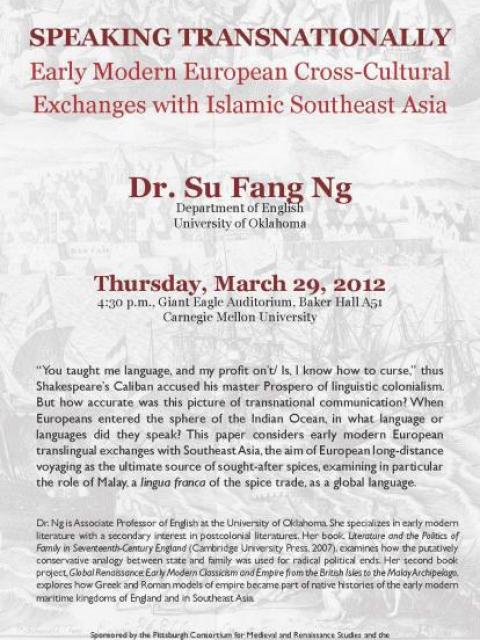
"You taught me language, and my profit on't/ Is, I know how to curse," thus Shakespeare's Caliban accused his master Prospero of linguistic colonialism. But how accurate was this picture of transnational communication? When Europeans entered the sphere of the Indian Ocean, in what language or languages did they speak? This paper considers early modern European translingual exchanges with Southeast Asia, the aim of European long-distance voyaging as the ultimate source of sought-after spices, examining in particular the role of Malay, a lingua franca of the spice trade, as a global language.
BIOGRAPHY:
Dr. Ng is Associate Professor of English at the University of Oklahoma.
She specializes in early modern literature with a secondary interest in postcolonial literatures. Her book, _Literature and the Politics of Family in Seventeenth-Century England_ (Cambridge University Press, 2007), examines how the putatively conservative analogy between state and family was used for radical political ends. Her second book project, "Global Renaissance: Early Modern Classicism and Empire from the British Isles to the Malay Archipelago," explores how Greek and Roman models of empire became part of native histories of the early modern maritime kingdoms of England and in Southeast Asia.
Wednesday, March 28th, 2012
Paul Adams is Assistant Professor of Political Science at the University of Pittsburgh at Greensburg. His research interests center around the relations between the European Union and Switzerland, Iceland, Norway, and the Microstates of Europe. He has also written articles on corporatism and comparative politics. Dr. Adams will be presenting this lecture, which is also on the program for the 2012 International Studies Association Convention in San Diego in April 2012.
Lunch will be served.

Is there such a thing as Jewish horror? Looking at examples of what has frightened Jews over three millennia of literary history, we'll venture some conclusions.
Jeremy Dauber is the Atran Associate Professor of Yiddish Language, Literature, and Culture, and Director of Columbia's Institute for Israel and Jewish Studies. His first book, Antonio's Devils: Writers of the Jewish Enlightenment and the Birth of Modern Hebrew and Yiddish Literature, was published in 2004 by Stanford University Press; in 2006, he and Joel Berkowitz published an anthology of their translations of landmark Yiddish plays; and in 2010, Yale University Press published his second monograph, In the Demon's Bedroom: Yiddish Literature and the Early Modern. He is the co-editor of Prooftexts: A Journal of Jewish Literature, a leading journal in the field. Dauber's research interests include older Yiddish literature, the literature of the Jewish Enlightenment, and Yiddish theater, and he teaches undergraduate and graduate courses on Yiddish literature, as well as courses on humor in Jewish literature and American Jewish literature. He regularly lectures on topics related to Jewish literature, history, and popular culture at the 92nd Street Y and other venues around the country. His newest book, a literary biography of Sholem Aleichem, should be available from Schocken/Nextbook press at the beginning of next year.
Tuesday, March 27th, 2012
Colloquium, Ruth Bottigheimer (Stony Brook), “What’s Eastern and What’s Western in the Arabian Nights?” with responses from Susan Andrade (English) and Giuseppina Mecchia (French and Italian).
Friday, March 23rd, 2012
Thursday, March 22nd, 2012
The main One Book One Community event for this year will be the Pittsburgh premier of Snow with writer/director Isaac Ergas and a panel discussion on the Role of Film in Public Health.
Snow is a short, live-action film based on the true story of Dr. John Snow, the father of epidemiology. The panel discussion will include:
Isaac Ergas: Writer/director and public health professional
Carl Kurlander: Writer/producer, University of Pittsburgh Film Studies Program and Steeltown Entertainment Project
Bernard Goldstein: Professor emeritus, GSPH Department of Environmental and Occupational Health
Adam Lowenstein: Associate professor, University of Pittsburgh Film Studies Program
Jeremy Martinson: Assistant professor, GSPH Department of Infectious Diseases and Microbiology
A reception will immediately follow this event in the Frick Fine Arts Cloister. Watch the trailer and learn more about the cast and crew on the movie's Web site.
Dr. Christian Burgsmüller is a career EU diplomat currently with the European External Action Service (EEAS), serving as Counselor at the EU Delegation to the U.S. in Washington, D.C. Dr. Burgsmüller studied law in Freiburg i.Br., Geneva and Cologne and worked as a trainee solicitor in Düsseldorf, Brussels, Cologne and Buenos Aires before passing the German Bar Exam in 2000 and subsequently joining the European Commission in Brussels as a career official.
Wednesday, March 21st, 2012
With financial crises looming in Europe, the world is bracing for new shocks. How will it all play out? Will the euro and the European Union survive? These and many other questions engage students at the University of Pittsburgh. Join us to learn about some of the initiatives that Pitt graduate students from varying disciplines are creating to bring the EU to campus (or bring the campus to the EU)! Don’t miss out on this chance to meet colleagues who have similar research, professional or extracurricular interests in the EU. And, of course, pizza will be served.
Tuesday, March 20th, 2012
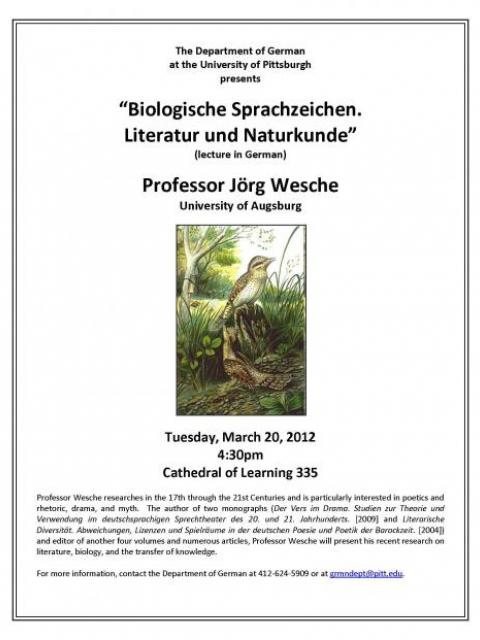
Professor Wesche researches in the 17th through the 21st Centuries and is particularly interested in poetics and rhetoric, drama, and myth. The author of two monographs (Der Vers im Drama. Studien zur Theorie und Verwendung im deutschsprachigen Sprechtheater des 20. und 21. Jahrhunderts. [2009] and Literarische Diversität. Abweichungen, Lizenzen und Spielräume in der deutschen Poesie und Poetik der Barockzeit. [2004]) and editor of another four volumes and numerous articles, Professor Wesche will present his recent research on literature, biology, and the transfer of knowledge.
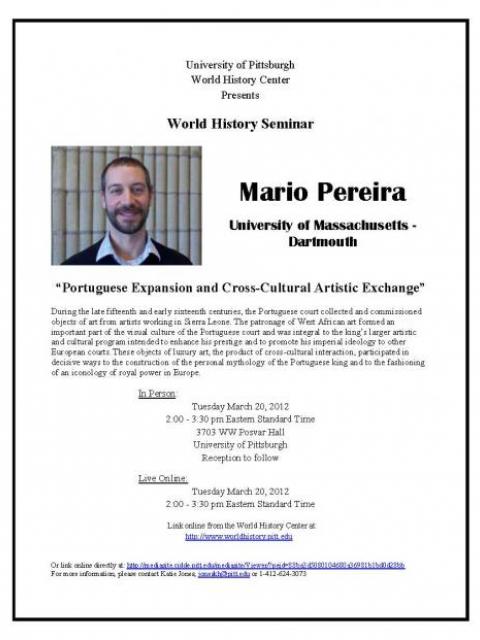
During the late fifteenth and early sixteenth centuries, the Portuguese court collected and commissioned objects of art from artists working in Sierra Leone. The patronage of West African art formed an important part of the visual culture of the Portuguese court and was integral to the king’s larger artistic and cultural program intended to enhance his prestige and to promote his imperial ideology to other European courts. These objects of luxury art, the product of cross-cultural interaction, participated in decisive ways to the construction of the personal mythology of the Portuguese king and to the fashioning of an iconology of royal power in Europe.
RECEPTION TO FOLLOW
Live Online:
Link online from the World History Center at:
http://www.worldhistory.pitt.edu OR link online directly at: http://mediasite.cidde.pitt.edu/mediasite/Viewer/?peid=88ba3d5080104680a...
On March 20, the regional Euro Challenge Competition will be held at the University of Pittsburgh. Co-sponsored by Global Solutions, WISE, and the European Union Delegation to the United States, regional high school teams will present on issues and fiscal policy regarding the Euro, the Euro Zone, and the European Union. Two teams will be selected to compete in the national Euro Challenge competition in New York City.
Saturday, March 17th, 2012
French Immersion institutes are designed for middle and high school French teachers, as well as French majors to broaden their cultural understanding of current events and international studies regarding French-speaking countries, to strengthen their French listening and speaking skills, and to share strategies for the teaching of French language and culture. We will be offering the following workshop spring, 2012
Topic: "Les Elections Présidentielles et Législatives Françaises de 2012
With Jean-Dominique Le Garrec, Consul Honoraire de France and Jean Pierre Collet, Ancien Consul Honoraire de France
Program Director : Bonnie Adair-Hauck, Ph.D.
Time: 8:30 a.m.-1:30 p.m. Room: 5200 Posvar Hall
Cost: $10.00 per workshop
Includes: ACT 48 credit, workshop; continental breakfast; lunch
Pennsylvania ACT 48 credit available for participants.
*****************All activities are conducted in French*****************
Friday, March 16th, 2012
Dr. Erik Gray is Associate Professor of English and Comparative Literature at Columbia University. He is the author of The Poetry of Indifference: From the Romantics to the Rubáiyát (Massachusetts 2005) and Milton and the Victorians (Cornell 2009), as well as the editor of Tennyson's In Memoriam (Norton 2004) and Spenser's The Faerie Queene, Book 2 (Hackett 2006). He has also published articles on a range of poets including Virgil, Sidney, Donne, Milton, Pope, Gray, Wordsworth, Coleridge, Shelley, Keats, Tennyson, the Brownings, and Christina Rossetti. This talk is drawn from his current book project on love poetry.
Thursday, March 15th, 2012
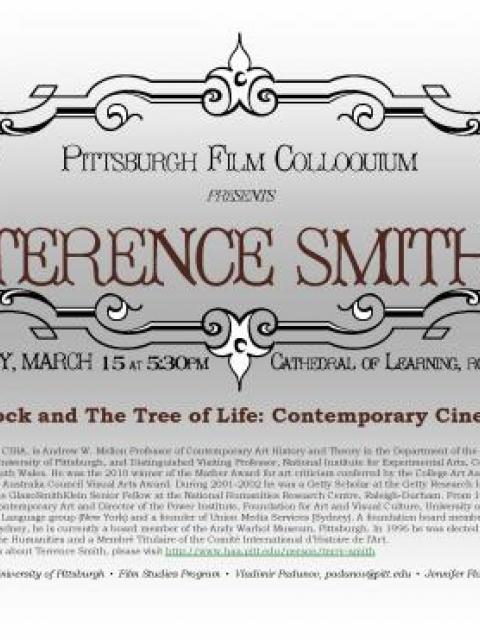
"The Clock and The Tree of Life: Contemporary Cinema Art," Pittsburgh Film Studies Colloquium
Terry Smith, FAHA, CIHA, is Andrew W. Mellon Professor of Contemporary Art History and Theory in the Department of the History of Art and
Architecture at the University of Pittsburgh, and Distinguished Visiting Professor, National Institute for Experimental Arts, College of Fine Arts,
University of New South Wales. He was the 2010 winner of the Mather Award for art criticism conferred by the College Art Association (USA), and recipient of the 2010 Australia Council Visual Arts Award. During 2001-2002 he was a Getty Scholar at the Getty Research Institute, Los Angeles, and in 2007-8 the GlaxoSmithKlein Senior Fellow at the National Humanities Research Centre, Raleigh-Durham. From 1994–2001 he was Power Professor of Contemporary Art and Director of the Power Institute, Foundation for Art and Visual Culture, University of Sydney. He was a member of the Art & Language group (New York) and a founder of Union Media Services (Sydney). A foundation board member of the Museum of Contemporary Art, Sydney, he is currently a board member of the Andy Warhol Museum, Pittsburgh. In 1996 he was elected a Fellow of the Australian Academy of the Humanities and a Membré Titulaire of the Comité International d’Histoire de l’Art.
For more information about Terrence Smith, please visit http://www.haa.pitt.edu/person/terry-smith.
Sponsored by the University of Pittsburgh • Film Studies Program
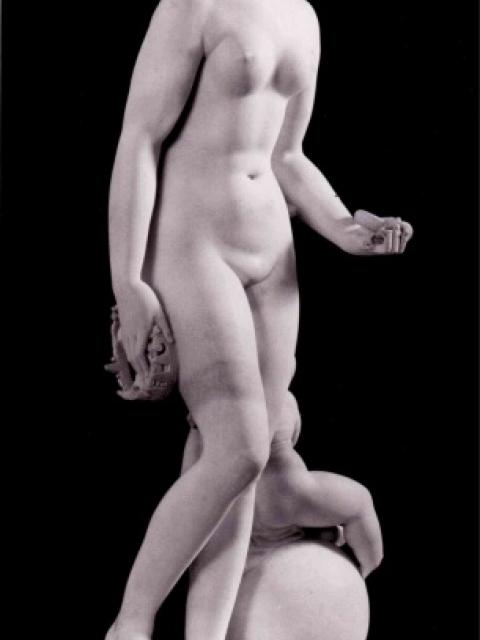
"The Art Collection of Christina of Sweden (1626-1689): Cleopatra rediscovered"
Enzo Borsellino, University ‘Roma Tre’
A XVI century marble statue representing a nude Cleopatra was hidden and forgotten for more than a century in the attic of Corsini Palace in Rome, formerly the Riario Palace. There, between 1659 and 1689, Christina of Sweden spent the end of her life, having famously decided to renounce her thrown to become Catholic and live in the city of Popes. During this time, she created a spectacular and important collection of ancient and modern art, unfortunately now dispersed worldwide. The piece in question is signed and dated 1574, a fact previously overlooked by everyone. Professor Borsellino will clarify the provenance of the statue and explain why it (fortunately) remained in the Riario-Corsini Palace until now. Long investigation has resulted in both the identification of the statue as a sculpture cited in two inventories of Christina’s art collection, where the figure was named for no reason “Venus” or “Nude woman”, and a careful reconstruction of the story of this marvelous and intriguing piece of art.
Professor Borsellino is visiting the University of Pittsburgh during the spring semester 2012 as a Distinguished Italian Fulbright Chair. He is an Associate Professor in Museology at the University ‘Roma Tre’ and has published over seventy books and articles on art history and museum studies.
This lecture made possible through generous support from the Delegation of the European Union.
University of Pittsburgh | University Center for International Studies | www.ucis.pitt.edu/euce
Requests to be added to our flyer distribution list should be sent to euce@pitt.edu.
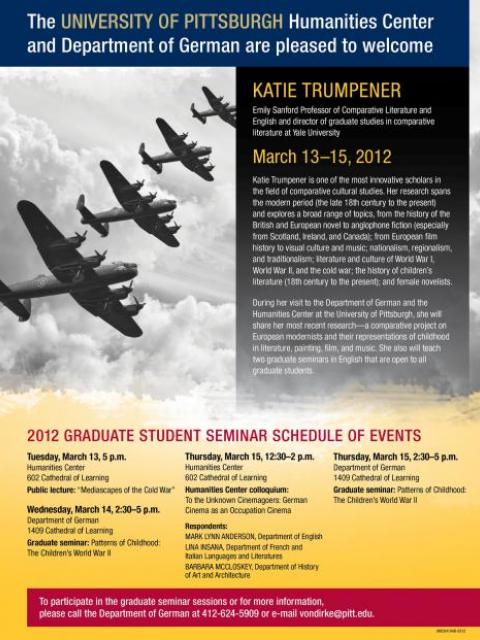
Katie Trumpener, Emily Sanford Professor of Comparative Literature and English and director of graduate studies in comparative literature at Yale University
This graduate seminar is in English and open to all graduate students.
Katie Trumpener is one of the most innovative scholars in the field of comparative cultural studies. Her research spans the modern period (the late 18th century to the present) and explores a broad range of topics, from the history of the British and European novel to Anglophone fiction (especially from Scotland, Ireland, and Canada); from European film history to visual culture and music; nationalism, regionalism, and traditionalism; literature and culture of World War I, World War II, and the Cold War; the history of children’s literature (18th century to the present); and female novelists.
Colloquium, “To the Unknown Cinemagoers: German Cinema as an Occupation Cinema,” with responses from Mark Lynn Anderson (English), Lina Insana (French and Italian) and Barbara McCloskey (History of Art and Architecture).
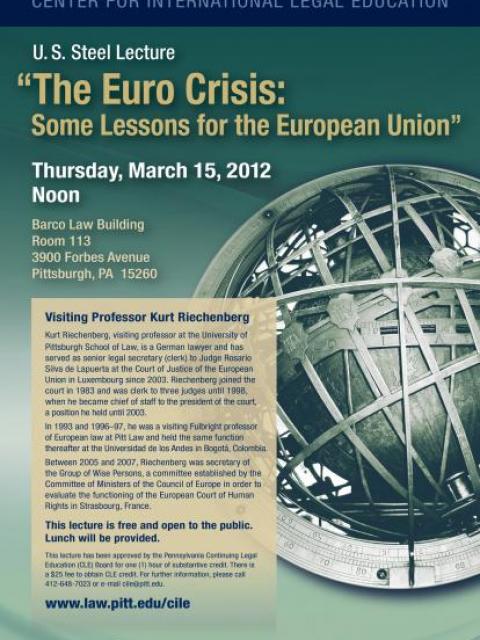
Kurt Riechenberg, Visiting Professor at the University of Pittsburgh School of Law, is a German lawyer and Senior Legal Secretary (Clerk) to Judge Silva de Lapuerta at the European Court of Justice in Luxembourg. He joined the Court in 1983 and was Clerk to three Judges until 1998, when he became Chief of Staff to the President of the Court, a position he held until taking his current post in 2003.
Lunch will be provided.
Wednesday, March 14th, 2012

Katie Trumpener, Emily Sanford Professor of Comparative Literature and English and director of graduate studies in comparative literature at Yale University
This graduate seminar is in English and open to all graduate students.
Katie Trumpener is one of the most innovative scholars in the field of comparative cultural studies. Her research spans the modern period (the late 18th century to the present) and explores a broad range of topics, from the history of the British and European novel to Anglophone fiction (especially from Scotland, Ireland, and Canada); from European film history to visual culture and music; nationalism, regionalism, and traditionalism; literature and culture of World War I, World War II, and the Cold War; the history of children’s literature (18th century to the present); and female novelists.
Tuesday, March 13th, 2012
A group of this year's LL.M. students will discuss past struggles and future challenges related to the rule of law in their home countries. The second of two lectures, this event will feature discussions by Ivan Milosevic (Serbia), Cristian Minor (Mexico), Kustrim Tolaj (Kosovo), and Abeer Hashayka, Wael Lafee, and Mais Qandeel (Palestine).
Friday, March 2nd, 2012
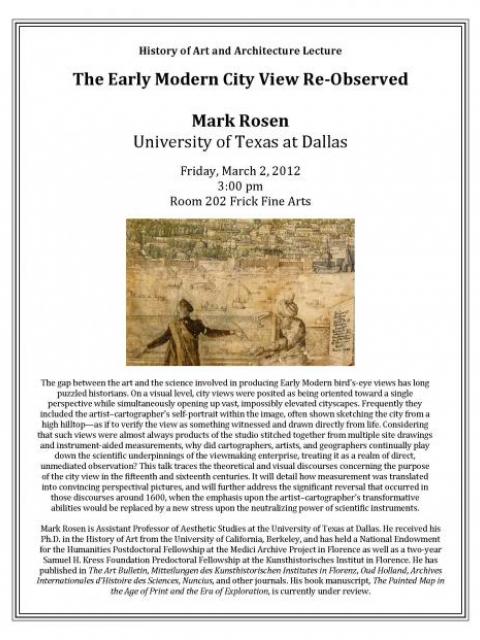
The gap between the art and the science involved in producing Early Modern bird’s-eye views has long puzzled historians. On a visual level, city views were posited as being oriented toward a single perspective while simultaneously opening up vast, impossibly elevated cityscapes. Frequently they included the artist–cartographer’s self-portrait within the image, often shown sketching the city from a high hilltop—as if to verify the view as something witnessed and drawn directly from life. Considering that such views were almost always products of the studio stitched together from multiple site drawings and instrument-aided measurements, why did cartographers, artists, and geographers continually play down the scientific underpinnings of the viewmaking enterprise, treating it as a realm of direct, unmediated observation? This talk traces the theoretical and visual discourses concerning the purpose of the city view in the fifteenth and sixteenth centuries. It will detail how measurement was translated into convincing perspectival pictures, and will further address the significant reversal that occurred in those discourses around 1600, when the emphasis upon the artist–cartographer’s transformative abilities would be replaced by a new stress upon the neutralizing power of scientific instruments.
Mark Rosen is Assistant Professor of Aesthetic Studies at the University of Texas at Dallas. He received his Ph.D. in the History of Art from the University of California, Berkeley, and has held a National Endowment for the Humanities Postdoctoral Fellowship at the Medici Archive Project in Florence as well as a two-year Samuel H. Kress Foundation Predoctoral Fellowship at the Kunsthistorisches Institut in Florence. He has published in The Art Bulletin, Mitteilungen des Kunsthistorischen Institutes in Florenz, Oud Holland, Archives Internationales d’Histoire des Sciences, Nuncius, and other journals. His book manuscript, The Painted Map in the Age of Print and the Era of Exploration, is currently under review.
Thursday, March 1st, 2012
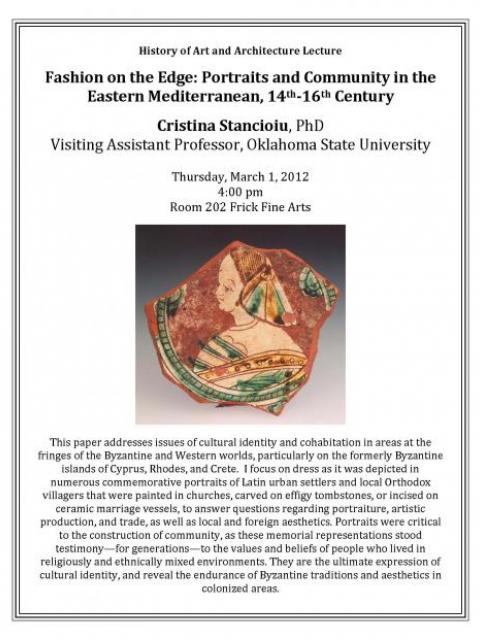
Cristina Stancioiu, PhD, Visiting Assistant Professor (Oklahoma State University)
This paper addresses issues of cultural identity and cohabitation in areas at the fringes of the Byzantine and Western worlds, particularly on the formerly Byzantine islands of Cyprus, Rhodes, and Crete. I focus on dress as it was depicted in numerous commemorative portraits of Latin urban settlers and local Orthodox villagers that were painted in churches, carved on effigy tombstones, or incised on ceramic marriage vessels, to answer questions regarding portraiture, artistic production, and trade, as well as local and foreign aesthetics. Portraits were critical to the construction of community, as these memorial representations stood testimony—for generations—to the values and beliefs of people who lived in religiously and ethnically mixed environments. They are the ultimate expression of cultural identity, and reveal the endurance of Byzantine traditions and aesthetics in colonized areas.
Trust in political institutions is one of the key elements which make representative democracies work. Trust creates a connection between citizens and representative political institutions. Democratic governments which enjoy a large degree of trust also tend to have higher degrees of legitimacy and policy efficacy. In Europe's multi-level governance structure, it is imperative to learn more about the determinants of trust in EU institutions. With the increasing salience of EU issues, are domestic proxies still a key determinant of evaluating EU institutions? Are there differences across the institutions and across the member states?
Galina Zapryanova received her PhD in April 2011 from the University of Pittsburgh. She was a Max Weber Postdoctoral Fellow at the European University Institute in Florence Italy 2010-2011. Since receiving her doctorate, she has been working as a Visiting Assistant Professor of Political Science at Truman State University in Missouri. In June 2012, Dr. Zapryanova will begin a research fellowship at the Mannheim Center for European Social Research in Mannheim, Germany.
Wednesday, February 29th, 2012
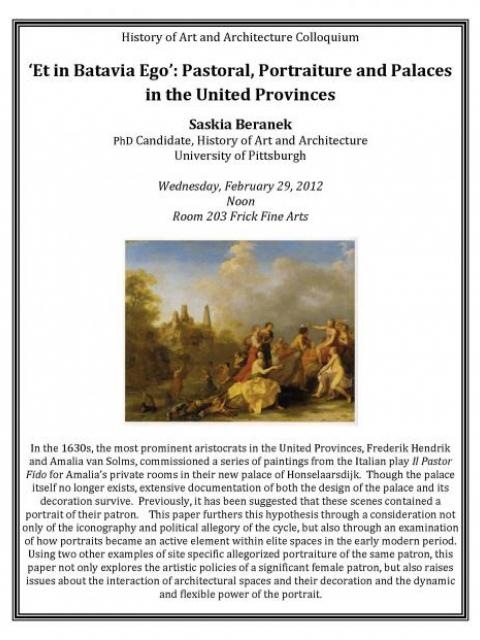
Saskia Beranek, PhD Candidate, History of Art and Architecture - University of Pittsburgh
In the 1630s, the most prominent aristocrats in the United Provinces, Frederik Hendrik and Amalia van Solms, commissioned a series of paintings from the Italian play Il Pastor Fido for Amalia’s private rooms in their new palace of Honselaarsdijk. Though the palace itself no longer exists, extensive documentation of both the design of the palace and its decoration survive. Previously, it has been suggested that these scenes contained a portrait of their patron. This paper furthers this hypothesis through a consideration not only of the iconography and political allegory of the cycle, but also through an examination of how portraits became an active element within elite spaces in the early modern period. Using two other examples of site specific allegorized portraiture of the same patron, this paper not only explores the artistic policies of a significant female patron, but also raises issues about the interaction of architectural spaces and their decoration and the dynamic and flexible power of the portrait.
Tuesday, February 28th, 2012
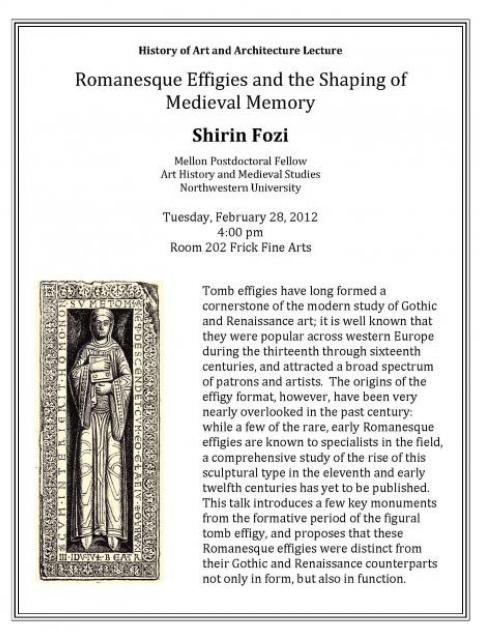
Shirin Fozi, Mellon Postdoctoral Fellow, Northwestern University
Tomb effigies have long formed a cornerstone of the modern study of Gothic and Renaissance art; it is well known that they were popular across western Europe during the thirteenth through sixteenth centuries, and attracted a broad spectrum of patrons and artists. The origins of the effigy format, however, have been very nearly overlooked in the past century: while a few of the rare, early Romanesque effigies are known to specialists in the field, a comprehensive study of the rise of this sculptural type in the eleventh and early twelfth centuries has yet to be published. This talk introduces a few key monuments from the formative period of the figural tomb effigy, and proposes that these Romanesque effigies were distinct from their Gothic and Renaissance counterparts not only in form, but also in function.
Monday, February 27th, 2012
Unveiled (Fremde haut)
Director Angelina Maccarone (2005)
Part of the: QUEER & FEMINIST FILM, Public Film Series at the University of Pittsburgh
When: January 9 – April 9, 2012
Cost: Free!
All screenings are open to the public. Bring your friends!
For more information about the series: http://pittqueerfemfilm.wordpress.com/public-film-series/
To learn about the film: http://www.imdb.com/title/tt0428672/
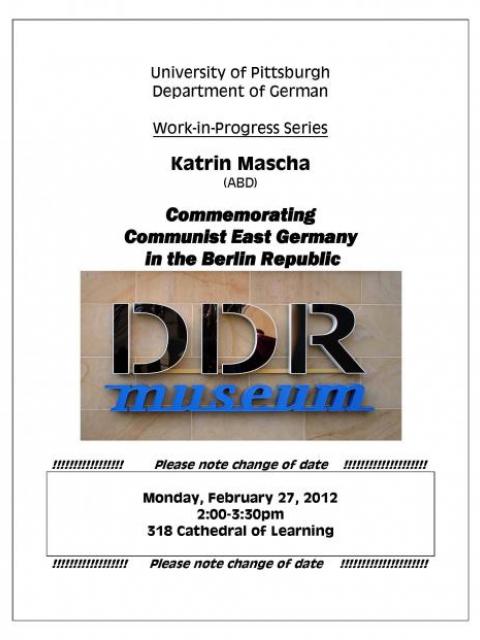
Work-in-Progress Series, "Commemorating Communist East Germany in the Berlin Republic," Katrin Mascha (ABD)
Friday, February 24th, 2012
Jeffrey S. Sposato, Associate Professor of Musicology
Moores School of Music, University of Houston
What can we learn about Johann Sebastian Bach’s church music practices by looking at his Leipzig successors? Scholars have previously assumed that when Gottlob Harrer took over as Thomaskantor after Bach’s death in 1750, he fundamentally rethought the musical priorities of the Leipzig service, increasing the importance of the concerted Latin mass and diminishing the role of the cantata. This paper uses Leipzig church diaries and the contents of Bach’s and Harrer’s libraries to demonstrate that the shift in musical focus from cantatas to masses attributed to Harrer was likely more gradual and began with Bach during the 1730s.
Jeffrey S. Sposato is Associate Professor of Musicology at the Moores School of Music, University of Houston. His most recent book, The Price of Assimilation: Felix Mendelssohn and the Nineteenth-Century Anti-Semitic Tradition (Oxford University Press, 2006), was named a Choice magazine Outstanding Academic Title for 2006 and a Royal Philharmonic Society Music Award finalist. He is currently working on a new book entitled Leipzig After Bach: Musical Life in a German City, 1750–1850. In 2011–2012, he is a Visiting Scholar at the University of Pittsburgh.
Piyusha Mutreja, Syracuse University
International Trade & Composition Of Capital Across Countries
Thursday, February 23rd, 2012
One Book, One Community Lecture Series:
"The Worldwide Fusarium Keratitis Epidemic of 2004-2006: What Would Dr. John Snow and Dr. Henry Whitehead Have Done?"
John Bullock, MD, MPH, MSc. Bullock is an infectious diseases epidemiologist at Wright State School of Medicine.
Also, part of the C.F. Reynolds Medical History Society Lecture Series.
Thursday, February 23rd, 2012 to Saturday, February 25th, 2012
The Tournées festival features a series of recent French films that will be screened in 35mm in Alumni Hall. It is an exciting group of films, and we hope you'll come and bring your friends, family, and students.
Feb. 23, 7:30 PM - "Welcome"
Feb. 24, 6:00 PM - "La Belle Endormie" (The Sleeping Beauty):
Feb. 24, 8:00 PM - "Boarding Gate"
Feb. 25, 7:00 PM- "35 Rhums" (35 Shots of Rum)
Feb. 25, 9:15 PM - "Hadewijch"
To view the full schedule & film descriptions: http://www.frenchanditalian.pitt.edu/documents/TourneesFrenchfilmseriesf...
Opening Reception to follow Welcome in the Alumni Hall Auditorium Lobby.
Wednesday, February 22nd, 2012
The squatting of physical spaces is an important form of protest in European social movements. From
the 1970s onwards, activists began to occupy abandoned buildings transforming them in spaces
where to experiment alternative lifestyles and elaborate radical politics. In Italy, squatted spaces,
usually named “Self-Managed Occupied Social Centers” and first established in the 1970s, became
the backbones of national and transnational social movements that emerged late in the 1990s. Far
from being dismissed, this form of collective action continues to be used in order to create spaces of
resistance and struggle in societies. Through a diachronic perspective, the meeting discusses: the
characteristics and ideological orientation of Social Centers; interactions between Social Centers and
public institutions; the role of Social Centers in social movement scenes.
Prof. Gianni Piazza is Professor of Political Science at the Faculty of Political Sciences, University of Catania. He
works on squatted spaces, territorial conflicts and social movements in Italy. Among his recent publications:
Which models of democracy? Internal and external decision-making processes of Italian Social Centers in a
comparative study (2011, CSPS-WP Series); Voices of the Valley. Voices of the Straits. How protest creates
communities (2008, with Donatella della Porta).
Dr. Alice Mattoni is a Postdoctoral Fellow at the Department of Sociology, University of Pittsburgh. She works on
media practices, precarious workers and social movements in Italy. Among her recent publications: Media
Practices and Protest Politics. How Precarious Workers Mobilise (2012); Mediation and Social Movements
(2012, with Bart Cammaerts and Patrick McCurdy, eds.).
Tuesday, February 21st, 2012
French Socialists & German Social Democrats Confront the Rise of the Far Right in the Bundesrepublik, 1950-52
Brian Shaev, Ph.D. Candidate, University of Pittsburgh
4:00 p.m., 3703 Posvar Hall
Sponsored by: the European Union Center of Excellence/European Studies Center, The University of Pittsburgh European Colloquium Series, Department of History
TUESDAY FEBRUARY 21, 2012
Conversations on Europe: “A New Germany in a New EU?”
12 – 1:30 p.m., 4217 WWPH
The EUCE/ESC will host the second in its ongoing series of Conversations On Europe. This series links top experts on the European Union via videoconferencing across several sites. Audiences at all sites will be able to interact with experts on a contemporary topic related to Europe and the EU. This session will be devoted to the topic “A New Germany in a New EU?” and will address, among other issues: Is it a ‘new EU’? Is Germany the new dominant force? Has Germany’s relationship to the EU and other members fundamentally changed? Will we see further replication of the German economic approach at the EU level? What will be the impact of recent developments in Germany? The session will be moderated by Professor Ronald Linden, Director of the EUCE/ESC.
Friday, February 17th, 2012
FRIDAY FEBRUARY 17, 2012
Round Table Discussion with Dutch Ambassador Renee Jones-Bos
3 pm, 4130 WWPH
The EUCE/ESC invite you to participate in a round table discussion with Dutch Ambassador Renee Jones-Bos Friday February 17 at 3:00 p.m. in 4130 Wesley W. Posvar Hall. To participate in the round table please register with Karen Lautanen at kal70@pitt.edu. The Dutch Ambassador is visiting Pittsburgh to celebrate the opening of the 2012 Distinctly Dutch Festival hosted by the Pittsburgh Cultural Trust. The three-month festival will feature dance, theater, music, visual art, film, literature and architecture. More information on the festival can be found HERE: http://dutchfestival.pgharts.org
Although Agnes Varda is recognized as an early avatar of feminist filmmaking, her 1965 film Happiness remains a misunderstood work, frequently criticized for its ostensibly anti-feminist message. This lecture excavates specific sources of imagery from French women’s magazines that idealized the daily drudgery of the housewife and explains how Varda applied this imagery to her characters to challenge feminine ideals. This lecture shows that Happiness expands visually and thematically on two influential texts: Simone de Beauvoir’s The Second Sex (1949) and Betty Friedan’s The Feminine Mystique (1963). As a director making feminist films in an unreceptive climate, Varda employed a sophisticated strategy of visual irony in Happiness that disputes the film’s narrative and traditional notions of domestic harmony. We can thus discern new depths in postwar feminism and appreciate Varda’s contribution to a complex, trans-Atlantic dialogue about the structure of domestic life.
Friday, February 17th, 2012 to Saturday, February 18th, 2012
This year's undergraduate Model EU will take place on the campus of Washington & Jefferson College. The following schools are sending students:
Bowling Green State University
Kent State University
John Carroll University
Washington & Jefferson College
University of Pittsburgh
University of Pittsburgh at Greensburg
Sylvia Kofler, from the Washington Delegation of the European Union will attend and give a presentation, as will EUCE Director Ron Linden.
Friday, February 10th, 2012
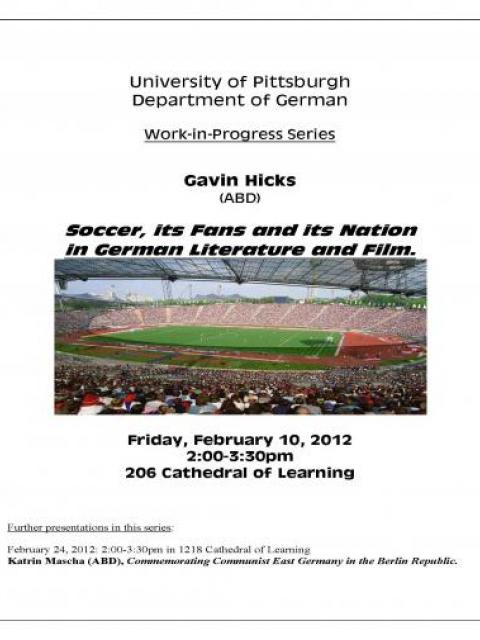
Work-in-Progress Series, "Soccer, its Fans and its Nation in German Literature and Film," Gavin Hicks (ABD)
Thursday, February 9th, 2012
Dennis Looney is a professor of Italian at the University of Pittsburgh, with secondary appointments in Classics and Philosophy. Publications
include: Compromising the Classics (1996); Phaethon’s Children: The Este Court and Its Culture (2005); ‘My Muse will have a story to paint’:
Selected Prose of Ludovico Ariosto (2010); Freedom Readers: The African American Reception of Dante Alighieri and the Divine Comedy (2011). In his current project he considers the recovery and reception of ancient history and its representation in early modern thinking in Europe, examining the relation between history and literature, fact and fiction, storia and fabula.
Please join us for a reception after the talk!
This annual event informs Pittsburgh-area high school students from underrepresented minority groups of international studies, study abroad, and internationally oriented career opportunities through panel presentations and small group discussions with African-American Pitt alumni and other international studies professionals.
Wednesday, February 8th, 2012
This talk revisits the concept of orientalism in a long chronological context, including 4th Century BC Athens, Elizabethan and Caroline England, Enlightenment Europe, and colonial and contemporary New Zealand.
It seeks to identify a specifically geographic component of this construct, which historians have neglected.
Jonathan Scott is Professor of History at the University of Auckland.
Among many other books and articles, he is the author of When The Waves Ruled Britannia: Geography and Political Identities, 1500-1800 (Cambridge, 2011), Commonwealth Principles: Republican Writing of the English Revolution (Cambridge, 2004), and England's Troubles: Seventeenth-Century English Political Instability in European Context (Cambridge, 2000).
Tuesday, February 7th, 2012
Barbara Tsakirgis, Associate Professor of Classics and Art History; Chair, Department of Classical Studies, Vanderbilt University
Greek houses of the Classical and Hellenistic periods incorporated a number of features that were designed for the safe-keeping of the entire oikos, the homeowner, his family and slaves, and their possessions. While many of these security measures do not survive intact in the archaeological record, they can be reconstructed from both scant remains and from literary and epigraphical accounts.
The physical provisions for security in Greek houses were many, including stoutly built doors and window shutters. Such means served both to enhance the actual security and the impression of it.
Additionally, human and divine protection alike were features of domestic security. Slaves were stationed at the street door and images of Hermes were placed there to add to that protection. Still other divinities, including Herakles Alexikakos, were also called upon to protect the home. On the other hand, while Classical Athens possessed a police force of Scythian archers, there is no evidence that this police force was charged with protecting private property.
Outside of urban areas, householders in the countryside gained added protection from the towers which were a common feature of farmhouses. Square or round in section, these towers were used both to protect the family and as storage places for grain.
Thursday, February 2nd, 2012 to Thursday, March 1st, 2012
TUESDAYS & THURSDAYS, STARTING FEBRUARY 2, 2012
“EUROPE AT 8:00” Eurochannel Short Films Tour
8:00 – 9:30 p.m., 4130 WWPH
Discover the newest perspectives of the European film scene through a series of short films from fifty-four film directors. The Eurochannel Short Films Tour has a strong regional footprint, revealing the creative genius of how cinema can be very diverse and surprising. Shaped by geographical and cultural features, those shorts films are as much charming as a work of the director’s passion. Stories of love or friendship in an adult’s brutal world, paintings of childhood feelings, stories of war or poverty, and comedies with unpredictable humor, Europe at 8:00 brings you the complexity of humanity as the European artists of the new generation see it. This series reflects unknown and unfamiliar dimensions of European reality.
Sponsored by: the European Union Center of Excellence/European Studies Center, the Russian & East European Studies Center
Europe at 8:00 – Film Schedule
Thursday, February 2
From Luxembourg: X on a Map, by Jeff Desom 13 minutes
From Portugal: Alfama, by João Viana 15 minutes
From France: Port of Call, by Eléa Gobbé-Mévellec 6 minutes
From Belgium: The End of the World, by Michael Havenith 10 minutes
From Azerbaijan: Theatrical Life, by Ilqar Najaf 22 minutes
From Latvia: Signs of Light, by Ilze Kunga 18 minutes
Tuesday, February 7
From Switzerland: Scribbling & Tingling, by Amaury Berger 13 minutes
From England: I’ll Tell You, by Rachel Tillotson 10 minutes
From Spain: Worstward Ho, by Alex Brendemühl 12 minutes
From Scotland: A Cheeky 20, by Chris Fallen 3 minutes
From Austria: Little World, by Marco F. Zimprich 18 minutes
From Poland: Endless Beginners, by Justyna Nowak 30 minutes
Thursday, February 9
From Bosnia & Herzegovina: I Don’t Dream in German, by Ivana Lalovic 13 minutes
From Italy: The Other Half, by Pipo Mazzepesa 9 minutes
From France: Last Markdown, by Nicolas Slomka 14 minutes
From Georgia: The Highway, by Sandro Japaridze 10 minutes
From Slovakia: Viliam, by Veronika Obertová 8 minutes
From Russia: Nail, by Michael Lockshin 13 minutes
From Albania: Snowdrops, by Robert Budina 26 minutes
Tuesday, February 14
From Belgium: Marie, by Jozefien Scheepers 17 minutes
From Switzerland: Parents, by Fernando Tiberini 11 minutes
From Spain: Lala, by Esteban Crespo Garcia 19 minutes
From Kosovo: The Dinner, by Blerta Zeqiri 17 minutes
From the Netherlands: Cat & Mice, by Nova van Dijk 9 minutes
Thursday, February 16
From the Czech Republic: Saharan Sands, by Josef Tuka 18 minutes
From Croatia: That Little Hand of Yours, Sara Hribar 23 minutes
From Ireland: The Ballad of Kid Kanturk, by John Butler 12 minutes
From Italy: From the 41st Minute, by Matteo Pellegrini 9 minutes
From Hungary: With a Little Patience, Laszlo Nemes 14 minutes
From Denmark: Peaceforce, by Peter Gornstein 19 minutes
Tuesday, February 21
From Serbia: Old Mountain, by Goran Stankovic 18 minutes
From Malta: .303, by David Serge 11 minutes
From Spain: Let’s Go to Plan B, by Paz Piñar 14 minutes
From Turkey: Snow, by Erol Mintas 22 minutes
From Wales: Skimming Pebbles, by Tariq Ali 9 minutes
From Romania: The Cage, by Adrian Sitaru 17 minutes
Thursday, February 23
From Montenegro: Masks, by Andro Martinovic 13 minutes
From Germany: Lumen, by Philip Koch 29 minutes
From Sweden: The Last Things, by Levan Akin 20 minutes
From Lithuania: Grandpa, by Andrius Paskevicius 11 minutes
From Moldova: Sasa, Grisa & Ion, by Igor Cobileanski 11 minutes
From Macedonia: Glow, by Tamislav Aleksov 15 minutes
Tuesday, February 28
From Switzerland: Laterarius, by Marina Rosset 3 minutes
From Cyprus: Trachoni, by Nick Kapros 10 minutes
From Ukraine: Her Seat is Vacant, by Bohdana Smymova 17 minutes
From Northern Ireland: Paint, by Ryan Tohill 9 minutes
From Iceland: Safe Journey, David Óskar Ólafsson 22 minutes
From Norway: A Tale of Balloons, by Torfinn Iversen 14 minutes
From Spain: Duck Crossing, by Koldo Almandoz 12 minutes
Thursday, March 1
From Belarus: Life is Infinite Return, by Vladimir Piskunovic 17 minutes
From Armenia: Ararat, by Renaud Armanet 13 minutes
From Bulgaria: Someone Else’s Steps, by Neda Morfova 4 minutes
From Greece: Samurai, by Theo Papadoulakis 26 minutes
From Finland: Kirkonkyla Kyrkby, Elise Pietarila 14 minutes
From Estonia: Champion, by Kaupo Kruusiauk 13 minutes